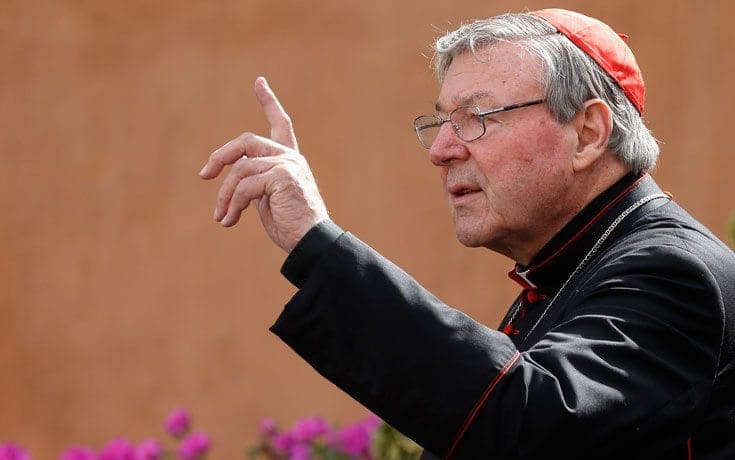ROME — A Vatican cardinal under fire for his record on child sexual abuse scandals, who was recently lampooned in his native Australia by a derisive song that’s passed half a million views on YouTube, has vowed that he’s ready and willing to cooperate with a national investigation.
“The past few days have seen a great deal of incorrect information relating to Cardinal George Pell and his upcoming Royal Commission appearance,” said a statement released by Pell’s Vatican office on Wednesday.
“The cardinal is anxious to present the facts without further delays,” the statement said.
The reference is to a national panel, called the Royal Commission, established in Australia in 2013 to investigation institutional responses to child sexual abuse, including in the Catholic Church. Pell already has testified twice before the body, in person, about his record on handling abuse complaints against other clergy, including during his tenure as archbishop of Melbourne from 1996 to 2001 and as archbishop of Sydney from 2001 to 2014.
That commission asked Pell to return to Australia in late 2015 to testify again, but Pell’s physician counseled the 74-year-old against the long plane flight, so he volunteered to appear by video conference from Rome. The Royal Commission recently accepted that offer, and is currently working out the details of Pell’s appearance.
The satirical anti-Pell song by Australian comic Tim Minchin, which was become an Internet sensation in Australia, challenges Pell to come back and “face the music.”
“You’re a coward, Georgie, come and face the music,” Minchin sings. “You owe it to the victims, Georgie.”
Pell serves as the Vatican’s secretary for the economy, in effect its chief financial officer, a position to which he was named by Pope Francis in February 2014. Prior to that, he was the dominant Catholic personality in Australia for two decades.
The fact that Pell will appear before the Royal Commission via video link has sparked an on-line crowdfunding effort that’s raised more than $80,000 to send a group of Australian abuse survivors to Rome who want to sit in the room when Pell gives his testimony.
So far, the Royal Commission has not indicated whether it will give permission for the group to be present.
Pell’s statement on Wednesday indicated he’s eager to participate.
“It is ultimately a matter for the Royal Commission to determine the precise arrangements for the provision of evidence by the cardinal in Rome,” it said. “The cardinal will continue to co-operate with whatever arrangements the Royal Commission determines, so that he can be heard on the days and at the times recently set by the commissioner.”
The statement also suggested Pell would not object to meeting with abuse victims.
“As Cardinal Pell has done after earlier hearings, he is prepared to meet with and listen to victims and express his ongoing support,” it said.
The statement insisted that Pell’s attitude on the abuse scandals has been mischaracterized.
“Cardinal Pell has always helped victims, listened to them and considered himself their ally,” it said. “As an archbishop for almost twenty years he has led from the front to put an end to cover ups, to protect vulnerable people and to try to bring justice to victims.”
Critics have accused Pell of failing to act on abuse complaints, seeking to limit financial compensation to victims, and of projecting indifference to the suffering caused by sexual abuse. At one point, a victim accused Pell of trying to buy his silence, but later denied suggesting that Pell had tried to offer a bribe.
Criticism of Pell by British abuse survivor Peter Saunders, who called the cardinal’s response to the abuse scandals “almost sociopathic” in an interview with Australian television, was reportedly part of the reason why members of Pope Francis’ anti-abuse panel, the Pontifical Commission for the Protection of Minors, recently placed Saunders on a leave of absence.
Pell, who turns 75 in June, continues to oversee the financial reforms in the Vatican desired by Francis when he created the Secretariat for the Economy in 2014, including supervision of the annual budgeting process for all Vatican departments.














